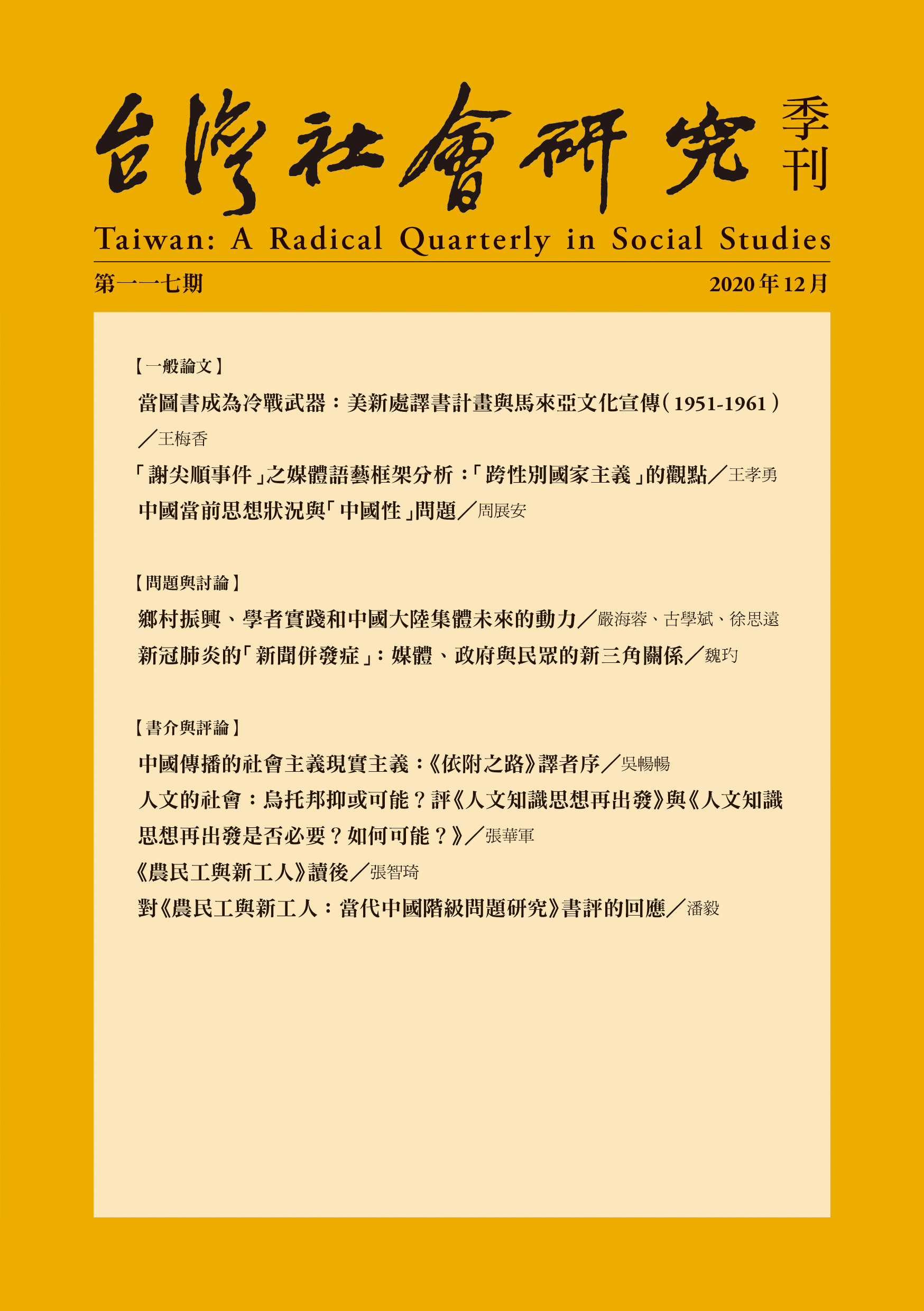
《台灣社會研究季刊》 第117期:
【一般論文】
當圖書成為冷戰武器:美新處譯書計畫與馬來亞文化宣傳(1951-1961)/王梅香(117民109.12 頁1-46)
美國新聞處(簡稱美新處)是冷戰時期美國官方的宣傳機構,譯書計畫是其文化宣傳的媒介之一。有別於既有文化冷戰論述側重美蘇兩國、由上到下、支配與從屬的觀點,本文運用多重史料,透過交互比較、相互連結的歷史方法,以「英美協商模式」的概念,分析新馬的美新處譯書計畫,說明美新處、英國文化協會和馬來亞聯合邦,透過書籍佔領與支配意識形態的共構過程。首先,英美權力在新馬呈現「宣傳分工種族化」,由英美官方負責對馬來亞官方和馬來人的宣傳。其次,在英國政府的主導下,譯書計畫出版中心從「新加坡美新處」轉移到「吉隆坡美新處」,從「華語」轉向「英語和馬來語」。英國政府對於馬來半島出版機制的整體規劃,使得美新處在馬來亞扮演「英國權力的協力者」,促使宣傳形式和內容「馬來化」。再者,美援文藝體制在馬來亞的宣傳內容具有「反共性」、「親美性」、「馬來性」和「中國性」。前三者由英美官方和香港友聯執行,但英美在「中國性」產生分歧。英國政府對於「中國性」主張全面禁絕,與美國主張認同自由中國的「中國性」產生歧異。最後,英美協商模式以「馬來亞」、「在地」和「民眾」名義,進行認同馬來亞的政治意識形態宣傳,其最終的目的是以馬來亞的文化想像,促成政治共同體的形成。
關鍵詞:文化冷戰、交互比較、英美協商模式、英國文化協會、香港友聯
U.S. Information Service (USIS) was the official propaganda agency of the U.S. during the Cold War, and its book translation program was one of its cultural propaganda media. In contrast to the existing viewpoints of Cultural Cold War that focus on the US-Soviet framework and the top-down control and domination / subordination, the article analyzes the book translation program of Malaya by adopting the perspective of the “Anglo-American Negotiation Framework” and examining multiple resources of historical materials with the methods of reciprocal comparison and connected histories. The research results illustrate that the book translation program involving the U.S., the British Council, and the Federation of Malaya was a co-building process of the ideological domination. Firstly, the UK and U.S. took the “racialized division of propaganda” and their officials were in charge of the propaganda solely for the Malayan government and the Malay population. Secondly, under the leadership of the British government, the publishing center of the book translation program was removed from “Singapore USIS” to the “Kuala Lumpur USIS”, and the language used in translation was from Chinese to English and Malay. The overall plan of the publishing mechanism in Malaya of the British government was to “Malayize the form of propaganda” and the U.S. played the role of the “coordinator of British power.” Thirdly, the U.S.-Aid literary institution in Malaya at the time was characterized as “anti-communism”, “pro-Americanism”, “Malayism” and “Chineseness”. The first three characteristics were agreed and implemented by both the British and American officials, along with Hong Kong as a partner. However, the British and American were divergent on “Chineseness”. The British officials advocated the elimination of “Chineseness”, while the U.S. officials approved of “Chineseness” as if it represented “Free China”. Finally, the “Anglo-American Negotiation Framework” used keywords such as “Malaya”, “local” and “people” to promote their political ideologies of which the ultimate goal was to establish the imagined Malay community.
Keywords: Cultural Cold War, reciprocal comparison, Anglo-American Negotiation Framework, British Council, Hong Kong Union Press
「謝尖順事件」之媒體語藝框架分析:「跨性別國家主義」的觀點/王孝勇(117民109.12 頁47-111)
本研究旨在對1950年代台灣的「謝尖順事件」之媒體報導進行語藝框架分析。「謝尖順事件」是台灣欲藉由打造「自由中國」的形象以建立統治正當性的性別事件和關鍵個案,其中更揭櫫「跨性別國家主義」(transgender nationalism)的語藝運作。研究發現,在謝尖順報導的「過程敘事」中,看似多重異質的聲音腔調透過管道框架、責任/義務框架、個人化框架和策略框架所具體架構出的變性或雙性身體,一方面乃異於醫學知識或一般常識之病理域外狀態,另一方面更被迫持續困勉而行地往主流性別二分框架靠攏。再者,謝尖順「在場卻缺席」的可見性政治使得她的存在雖然挑戰了當時社會對於性的生物本質論、身體與性別認同間的連續性之既定慣性認識,卻釀成更全面地、更大規模地、更有「國家性」甚至是國際觀的對性別身體和個體的馴化管控。在此,約定俗成的異性戀霸權與性別僵化觀被回溯性地、無縫接軌地藉由性別重建手術而確立其優勢排他地位。性與身體的重新打造不但因此與個體的自我、自主意識無涉;更有甚者,醫療、軍隊和國家共謀的語藝奇觀更巧妙地把謝尖順微弱的現聲,論述為深明大義、以國家之名、以大局為重。
關鍵詞:自由中國、同志國家主義、跨性別、跨性別國家主義、語藝框架、謝尖順
This paper aims to elaborate the rhetorical construction of “transgender nationalism” by analyzing the media reporting and its framing of the “HSIEH Chien Shun Event”. The “HSIEH Chien Shun Event” is a gendered event and a critical case in Taiwan in the 1950s; thereby, the then Kuomintang government attempted to construct its political legitimacy and technological advancement of the “free China” (by contrast to decay and the uncivilized of mainland China governed by the Chinese Communist Party). This paper argues that multiple voices referring to HSIEH exemplified a specific kind of “emergence narrative” via conduit frame, accountability frame, personalization frame and strategy frame. Herein, a transitional or intersexual body was diagnosed as an alien or abnormal state which was apart from existed medical knowledge and physiological common sense; nevertheless, that body status still edged up to the mainstream gender binary exhaustedly. Even though the media representation of HSIEH indeed dismantled the supposed continuity between biological sex and gender identity to some extent, HSIEH’s “present absence” and visibility politics still activated the overwhelming, nationalized and internationalized disciplinary control over individualized body under the then Kuomintang regime. My research findings suggest that both cisnormativity and heteronormativity were further maintained through the very sex reassignment surgery in this case. Furthermore, the reconstruction of sex and body had been deployed as the spectacle by the conspiracy rhetoric among medical system, military army and the nation state rather than the gender consciousness and the self of HSIEH. HSIEH’s faint existence and weak voice couldn’t be anything but the reified patriotic object served in the name of the country.
Keywords: the free China, homonationalism, transgender, transgender nationalism, rhetorical framing, HSIEH Chien Shun中國當前思想狀況與「中國性」問題/周展安(117民109.12 頁113-165)
當前中國知識界正出現對「中國性」問題的聚焦。所謂「中國性」問題,指向的是一個問題論域,是指不同研究者以各自視角深入中國的歷史經驗和現實實踐,探討其獨特性,嘗試將「中國」提煉為一個理論概念。知識界對「中國性」問題的關切和新時代歷史條件下執政黨與民眾思想狀況所出現的變化緊密相關。對「傳統中國」的研究、對「革命中國」的研究、對「現實中國」的研究這三個維度構成當前知識界思考「中國性」問題的主要切入點。但是,這種劃分方式無法解決「傳統」、「革命」、「現實」之間的張力。為此,需要深入歷史肌理,把握歷史大勢中的「問答結構」。就此會發現近代以來的中國和明末以來的中國具有一種可概括為「向下超越」的連續性。這也是一種可稱為「質的時代」的連續性。而宋明一系的歷史可稱為「文的時代」。重新啟動孔子所說的「文質彬彬」的史觀可以化解「傳統」、「革命」、「現實」之間的張力,為建立貫通的中國敘事提供啟發。
關鍵詞:思想狀況、中國性、革命、向下超越、文質
At present, Chinese intellectual circles are focusing on the issue of “Chinese character”. The so-called “Chinese character” refers to a problem domain, which refers to different researchers’ penetrating into China’s historical experiences and practical practices from their own perspectives, exploring its uniqueness and trying to refine “China” into a theoretical concept. The concern of the intelligentsia on the issue of “Chinese character” is closely related to the changes in the ideological situation of the ruling party and the people in the new era. The three dimensions, “traditional China”, “revolutionary China”, and “real China”, constitute the main entry point for the current intellectual community to think about the issue of “Chinese character”. However, this way of division cannot solve the tension between “tradition”, “revolution” and “reality”. Therefore, it is necessary to deepen the historical texture and grasp the “question and answer structure” in the historical trend. It will be found that China since modern times and China since the end of Ming Dynasty have a kind of continuity that can be summarized as “downward transcendence”. This is also a kind of continuity that can be called “the era of matter”. The history of Song and Ming Dynasty can be called “the era of idea”. Reactivating Confucius’ historical view of “being gentle”(wen zhi bin bin) can resolve the tension between “tradition”, “revolution” and “reality”, and provide inspiration for the establishment of a coherent Chinese narrative.
Keywords: ideological situation, Chinese character, revolution, downward transcendence, idea and matter
【問題與討論】
鄉村振興、學者實踐和中國大陸集體未來的動力/嚴海蓉、古學斌、徐思遠(117民109.12 頁167-197)
中國大陸農村改革既反映了治國精英的現代化策略,也是對底層動力的反饋。它蜿蜒曲折的步伐說明,在國家策略中,農村發展是一個不斷變化的政治和經濟問題。我們認為,在「農民」問題上,中國共產黨採取了策略性的本質主義(strategic essentialism)。一方面,中國共產黨將「農民」視作一個階段內統一的範疇,同時利用這一範疇內部的差異,來推動長期變革的目標。在後毛時代改革的背景下,政策一方面強調保護「農民」,但也鼓勵農民分化,這一矛盾給中國大陸當前的鬥爭同時帶來了機會和障礙。我們也認為,中國大陸政府近期推動的鄉村振興是「國家主導的邊緣策略」(state-guided periphery strategy)的一部分,它的目標是使資本向國內外金融化程度低的地區流動。在這一背景下,本文考察了改革時期的政策和話語如何把握和界定農村問題,並討論了學者社會參與(scholar activism)的兩個案例─中國大陸的鄉村建設運動和人民食物主權網絡。
關鍵詞:農民、策略性的本質主義、鄉村建設、食物主權、中國大陸
Rural development in the Chinese state’s strategy has been a changing political-economic problematic. The state has practiced a strategic essentialism with regard to “peasantry.” It has actively taken “peasantry” as a temporary unifying master-category while at the same time working with the differences within the category for the long-term goal of transformation. The post-Mao contradiction, emphasizing the protection of the “peasantry” while encouraging differentiation, offers contemporary struggles both opportunity and frustration. This essay examines how the rural has been conceptualized in reform-era policies and discusses two cases of scholar activism, the rural reconstruction movement and the food sovereignty network in China.
Keywords: peasantry, strategic essentialism, rural reconstruction, food sovereignty, China
新冠肺炎的「新聞併發症」:媒體、政府與民眾的新三角關係/魏玓(117民109.12 頁199-215)
【書介與評論】
中國傳播的社會主義現實主義:《依附之路》譯者序/吳暢暢(117民109.12 頁217-240)
人文的社會:烏托邦抑或可能?評《人文知識思想再出發》與《人文知識思想再出發是否必要?如何可能?》/張華軍(117民109.12 頁241-266)
《農民工與新工人》讀後/張智琦(117民109.12 頁267-277)
對《農民工與新工人:當代中國階級問題研究》書評的回應/潘毅(117民109.12 頁279-282)


